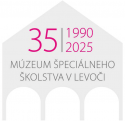Blum´s Institution in Plesivec, 1898
By the 19th century the dementia was not studied from clinical, social or pedagogical point of view. The early research came from France where psychiatrist Filip Pinel (1745-1826) was writing about the causes of dementia. Care of the weak-minded in Slovakia began to develop at the late 19th century thanks to Samuel Blum, founder of Blum´s Institution in Plesivec. The Blums laid the foundations for education of the mentally handicapped in Slovakia. The public welcomed the establishment of the Blum´s Institution. It is backed by the reports from the newspapers which wrote about this. Newspapers Sajó Vidék No. 8 from 16. 6. 1898 published the information that the institute will be built as pavilion on the grounds owned by S. Blum. In the beginning it will be two pavilions and later 24. Son of Samuel Blum – Rudolf – traveled on business trip abroad in order to get the most professional knowledge and personal experience. The visited The National Institute for idiots in Budapest, stayed six weeks in Walldorf near Berlin in what was then the world-famous “madhouse” by which was also located another Institute for idiots. He visited a shelter for epileptics in Wahlgart and also a special pavilion for cretins. He studied in Kückenmühl near the North Sea at the Institute for idiots. After passing the exams and getting the required qualifications he took the direction of the Institute after his father.
Development of the institute was stopped by the World War I because right from its inception the institute was made available to the Red Cross for the wounded and sick soldiers. Department of dementia was partially reduced and the institute has become a makeshift military hospital with a daily average of 600 military patients. Throughout the whole war this hospital took more than 10,000 patients. After the war and the establishment of the Czechoslovak Republic the activity of the institute is fully restored, but already in the spring of 1919 with the occupation of the borders by Hungarian Red Army are the buildings of the institute considerably demolished and Blum´s Institution became a place of the Hungarian Red Army headquarters. After their the retreat the city of Plesivec is occupied by Czechoslovak army and their headquarters was established in one of the buildings of Blum´s Institution. V r. 1920 Rudolf Blum died in 1920 and his widow Flora Blum took the direction of the institute. However, On 1 April 1921, she married a former officer of Czechoslovak army, Jan Horak, who then became a director of the institute.
After the disintegration of Czechoslovakia Plesivec remained in the territory which was occupied by Hungary after the Vienna Arbitration. Jan Horak and his wife went to Prague where they both died during the Protectorate regime. The activity of the institute was suspended in the wartime: patients were transferred to other institutions in Hungary. After 1942 the institute served as a tuberculosis sanatorium for Hungarian soldiers and later as a military hospital. The reconstruction of the preserved buildings began in 1950. In 1952 the renovated institute is opened as a State institution for the treatment of brain diseases in Plesivec which was initially established with 50 beds for women only.
In 1953 the institute was renamed as Psychiatric hospital in Plesivec with a capacity of 220 beds and since 1956-1961 it was 299 beds. From 1 January 1992 the Psychiatric Hospital in Plesivec became an independent organization managed directly by the Slovakian Ministry of Health.
Another directors: Frantisek Gaspar, Anna Drienkova – Vranova, Ladislav Koller, Milan Quirschfeld, Ladislav Mechura, Jozef Greskovic and Pavol Dzodla.
Currently the Psychiatric Hospital of Samuel Blum in Plesivec, with a capacity of 200 beds, is a medical facility of supra-regional character providing comprehensive long-term psychiatric care for patients from the catchment area with about 850,000 inhabitants (Trebisov, Kosice-city, Kosice-periphery, Roznava, Spisská Nova Ves and Poprad).
Source:


